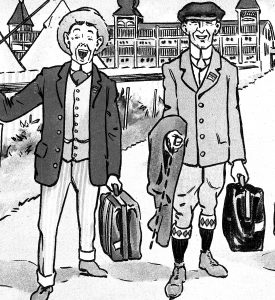
The Biggest in the World
By Sidney Horler
If Richard Jefferies were alive and he went to Douglas – as every self respecting lover of bounteous nature should know – I know where he would stay.
No hotel. Jefferies would have the soft witchery of the evening sky above him when he slept, with no roof in between. He would sleep if he could in a tent.
Now, in Douglas Free, there is only one place where you can sleep in a tent. The glorious promenade is made up of palatial boarding establishments and here convention, more or less, rules day and night. But away to the left, at the top of 100 steps which leave a way faced streetling pale and gasping, there is a town within a town where upwards of 2,000 youths and men sleep, be the night wet or fine, in tents, with the canvas doors flapping in the breeze.
It is the largest place of its kind in the world; and its fame has spread so that men are coming from all parts of Europe to test for themselves this new era in open air holidaying.
I have been all over the camp, and can only describe it as poor Dominic Sampson’s word – “prodigious!” When I tell you that the dining hall can seat 2,500 people, and is the largest by far of its kind in the world, you commence at the beginning of a series of shocks. I think I will go on staggering you: below are a few facts. The camp has its own: – laundry, bake house, post office, swimming bath, savings bank, offices, theatre, concert hall, orchestra, photographic department etc.
It has staff of 150 servants, ten clerks, three butchers who do nothing but cut up joints. The bake house is working continuously three shifts of men doing eight hours at a time. The amount of bread that is consumed is beyond the calculation of man as the number of dishes washed in a week, considering that there are two machines in the kitchen which wash, sterilise, and dry 12,000 in an hour. You meet all classes when walking round. For instance in one morning I met and conversed with a City Missioner from Liverpool, sons of two members of Parliament, a couple of Justices of the Peace, one County Councillor and the nephew of a London Physician, besides a polyglot crowd of city clerks, shop assistants, and others, to whom the camp is a brief snatch of paradise with its manly life and manly ways.
They do not study conventionality. Sweaters are generally worn, collars being left off after the first day. Loose tweeds, giving the limbs perfect freedom, are the uniform dress, and very fit and healthy do many of the youths look after a week’s stay.
But when I said conventionality is barred it must not be supposed that there is any licence allowed or indulged in. The atmosphere of the place is altogether healthy, sane, and wholesome. A service is held every morning not to mention Sundays. City Missioners from Liverpool and Manchester are generally in attendance and they have a special tent which is known as the Manse.
This spiritual overlooking undoubtedly has its beneficial effect. Mr Cunningham told me he had not known a quarrel take place during the years he had been there, and bad language never disturbed the even serenity of the place.
Every year has seen the camp growing and no hesitation has ever been shown in making wide spreading improvements. To come right up to date, additional land (to be used for sleeping accommodation) has been secured. And a tunnel bored to connect it with the camp proper. Then again a huge warehouse has been put up for the storage of groceries provisions etc.
The savings bank is quite a good idea. Campers here can deposit any valuable, money, railway tickets, etc, free of charge.
Image: Collection of Jill Drower

